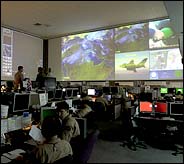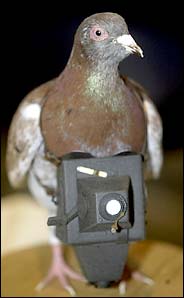| Want to send this page or a link to a friend? Click on mail at the top of this window. |
| Posted November 23, 2003 |
| A Battle of Words Over War Intelligence |
| By JUDITH MILLER |
Intelligence — or rather bad intelligence — has become an obsession in Washington. Fueled by the growing casualties among American soldiers in Iraq and the administration's failure to find weapons of mass destruction there, the Central Intelligence Agency, Congress, an independent commission and scores of private experts and government analysts have been fiercely debating what went wrong in Iraq and, more broadly, the state of the government's intelligence capabilities. Advertisement
Enter Sir John Keegan, the eloquent, pre-eminent British historian of war with an iconoclastic notion: despite the finger pointing and passionate debate, he concludes in a new book that intelligence — good or bad — matters far less than brute force in winning wars.
| _______________ |
| "Only force finally counts,' a military historian insists. |
| _______________ |
"War is ultimately about doing, not thinking," writes Sir John, the author of 16 other books about war and military tactics, including the instant classic, "The Face of Battle." In his latest offering, "Intelligence in War" (Alfred A. Knopf), he insists again and again, "Only force finally counts."
"Decision in war is always the result of a fight, and in combat willpower always counts for more than foreknowledge," he argues. "Let those who disagree show otherwise."
A number of Western military historians, political scientists, diplomats and defense experts have taken up the challenge. Most of them would agree with Richard Holbrooke, the former diplomat who as chief negotiator to the Balkans conflict in the mid-1990's helped end that war. He called Sir John's theory "not only counterintuitive but wrong."
 |
United States Air Force |
| Air Force controllers monitoring the Middle East. A new book contends that brute force, not intelligence wins wars. |
"Is Keegan right in arguing that intelligence is overrated? Yes," Mr. Holbrooke said. "But intelligence is also indispensable. And its greatest successes are preventative."
Sir John readily acknowledges that good intelligence is essential to successful battles and campaigns. He opens his new book quoting the Duke of Marlborough's dictum: "No war can be conducted successfully without early and good intelligence." But Sir John rejects what he calls the romantic myth that victory depends mainly on spies, stolen secrets and cracked codes.
To support his thesis he explores a series of gripping case studies, from Admiral Nelson's 73-day chase of the French fleet and its ultimate defeat at the Nile in 1798, to Stonewall Jackson's Civil War campaign in the Shenandoah Valley, to some of the most harrowing naval battles and bloody campaigns of the World Wars. In each episode, he argues, the role of intelligence was highly overrated.
Nelson's intuitive genius about Napoleon, for instance, mattered far more in defeating him than the intelligence on the French fleet's location that arrived late from London. The Allies in World War II could have won the battle against the German U-boat fleet "without the assistance of the code breakers," he maintains. In 1941, though British cryptanalysts had broken the Germans' Enigma Code and clearly saw the shape of the German forces, the British lost Crete because the British commander made fatal mistakes.
Bruce Hoffman, director of RAND's Washington office and a terrorism analyst, said that although Sir John analyzed the role of intelligence in countering Al Qaeda, most of his examples were drawn from 18th- to 20th-century wars rather than 21st-century conflicts. "Keegan is largely right on the role of intelligence in conventional wars," Mr. Hoffman said, "but he is not right about counterinsurgencies in any century, when intelligence is the sine qua non of success." Modern wars, he argued, are not fought only with military tools. "So intelligence has a very different role today. You can no longer fight, much less win them just with military strength."
Mr. Hoffman maintained, for instance, that poor intelligence on the radical jihadists and pro-Saddam Hussein loyalists who are killing both Iraqis and American soldiers today "is one of our major problems in Iraq."
Roger Cressey, the former chief of staff to President Bush's Critical Infrastructure Protection Board and a former director for transnational threats at the National Security Council under President Bill Clinton, agrees, noting that America is being forced to fight modern wars under far greater constraints than ever before. "Intelligence isn't particularly important if you have a scorched-earth policy or are spending a lot of time in the Soviet archives," Mr. Cressey said. "But if you are trying to win hearts and minds by killing as few civilians as possible, good intelligence on, say, where insurgents, as opposed to noncombatants, are located, is hugely important."
John Hamre, a deputy secretary of defense under Mr. Clinton who led a survey group to Iraq last summer for Defense Secretary Donald Rumsfeld, said that even the projection of the overwhelming force that Sir John endorses is dependent today on good intelligence. "You can no longer separate intelligence from overwhelming force," said Mr. Hamre, who now heads the Center for Strategic and International Studies, a private organization in Washington. "We have that force because we have tactical intelligence."
The technological advances largely of the past decade have transformed modern warfare, he said, adding: "We can now integrate national-level intelligence with the tactical level, and we can integrate what comes from the intelligence agencies quickly to the front lines for battlefield surveillance. Our force is so overwhelmingly powerful because of good intelligence, not because we fly or move faster than they do."
Mr. Hamre called the past decade's technological advances "nothing short of spectacular." By making a huge array of intelligence sensors "an organic part of operations, we have a wide range of sensors that are largely beyond the knowledge of our opponents," he said. "It's multidimensional, and both passive and active, and it is what makes our force so overwhelming."
Consider the war in Iraq, he said. In the last two days of the roughly monthlong military campaign, "in 27 minutes, we changed the attack program of a B-1 in the air to drop a bomb on what we thought was Saddam Hussein's bunker."
Kenneth Pollack, another former Clinton administration official now at the Brookings Institution, argued that modern warfare would increasingly be dominated by those who control what he called the "information spectrum." "In an age of long-range strike weaponry, brilliant munitions, hypereffective sensors, whoever has greater information will be able to bring far greater fire power on a much wider range of targets and in a much shorter time than ever before," he said. That was why "the U.S. military is now in a class by itself."
 |
Agence France-Presse |
| _______________________ |
| Both sides in a debate about brains and brawn cite the war in Iraq for support. |
| _______________________ |
Such intelligence information is particularly vital at the strategic level. "War has become so much more destructive through concealment and long-range strikes that the warning time before an attack has diminished considerably," Mr. Pollack said. Terrorists armed with weapons of mass destruction, states and other nonstate actors could inflict terrific damage in a much shorter time frame than ever before."
Thus, he argued, it is becoming increasingly vital that a country have accurate information about the intentions and capabilities of an adversary, especially for an administration that has promoted a doctrine of preventive wars.
"If you're worried about Osama bin Laden or North Korea, then you want to make damn sure that you know what they have, as well as where and when they're going to try to hit you before they do," Mr. Pollack said.
But that is precisely the problem, Sir John notes. In the war against terrorism, good intelligence may be extremely hard to obtain, particularly against Al Qaeda. A "coalition of like-minded but separate groups" despite its name, which in Arabic means "the base," Al Qaeda is a diffuse target, and one that has thus far been fairly resistant to America's high-tech, electronic surveillance prowess, he says. The United States, he warns, will have to rely on old-fashioned spies rather than gadgets. But in this regard the America he so obviously admires is decidedly weak.
On this point Edward N. Luttwak, a maverick defense analyst at the Center for Strategic and International Studies, shares Sir John's concern. For all its electronic surveillance wizardry, the "humint" or human intelligence needed to combat Al Qaeda's terrorism is not America's strength, Mr. Luttwak argues. "Overhead technical means of collection do you no good," he said. "And Al Qaeda members have learned how to evade intercepts. Humint over the past years has yielded virtually nothing. It doesn't suit Americans."
"To be a case officer you have to be a poet," he continued. "You need to romance and seduce. You need to be able to learn Urdu in six months." Woefully short of language skills, many American intelligence officials, "can't even ask for a cup of coffee."
But this failing, too, highlights the danger inherent in relying on poor intelligence in 21st-century conflicts, Mr. Luttwak maintains.
In an interview Sir John seemed willing to modify an argument in his book to reflect the potentially dire consequences of bad intelligence about terrorists armed with nuclear, biological or chemical weapons. While he wrote that intelligence was the "handmaiden, not the mistress of the warrior," he added that with respect to groups like Al Qaeda and decisions on preventive war, intelligence may well be "an indispensable servant of force."
Copyright 2003 The New York Times Company. Reprinted from The New York Times, Arts & Ideas, of November 22, 2003.
| Wehaitians.com, the scholarly journal of democracy and human rights |
| More from wehaitians.com |